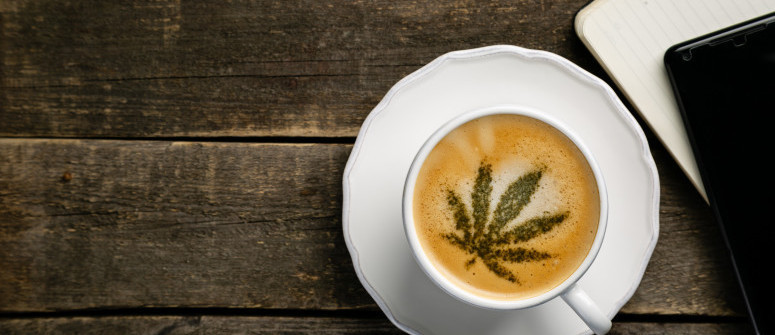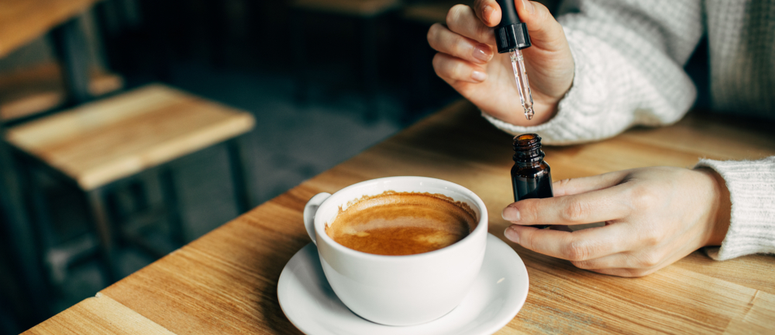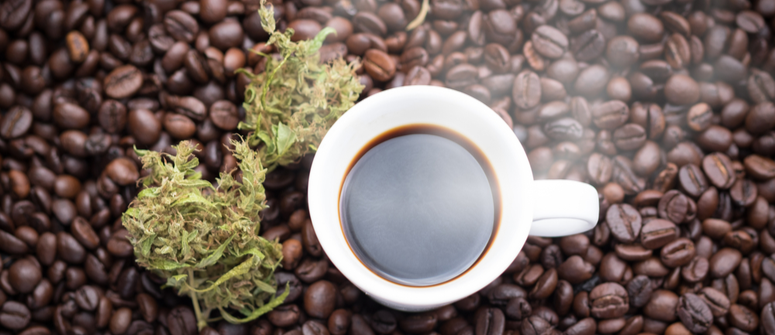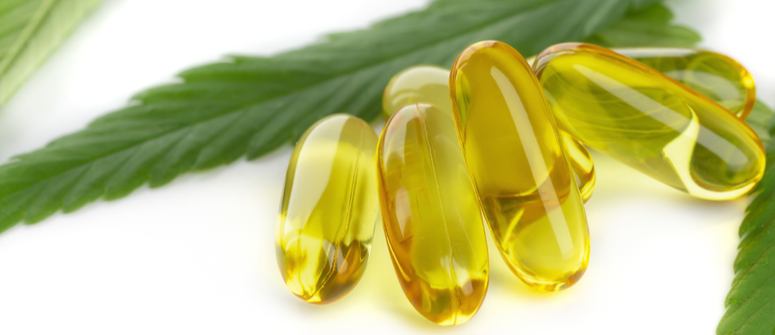What happens when you mix CBD and caffeine?

CBD, on its own, bears numerous potential benefits. But what happens when you mix it with caffeine? We have the answer for you.
Contents:
Over the years, experts have studied the benefits of caffeine and found interesting results. Apart from being your daily energy jolter for lethargic mornings, research pointed to potential improvements in mental function, among others.
It is the same case with cannabidiol, or more popularly known as CBD. Numerous studies have investigated its potential effects for certain physical and mental conditions. Most notably, it gained a reputation as a plausible avenue for supporting those suffering from epilepsy.
But what happens when you mix both substances? Are their perceived benefits amplified? Or does one cancel out the other?
If you happen to have these questions, this article should provide some answers. We’ll look further into the effects of mixing CBD and caffeine.
How Does CBD Work?
As it is with all cannabinoids, CBD interacts with the body’s endocannabinoid system. But unlike its psychotropic cousin THC, it influences the receptors of the ECS a lot differently.
First and foremost, CBD does not bind with the ECS’s main receptors, the CB1 and CB2. Instead, it interacts with other receptor sites like the vanilloid receptor (for pain detection), PPARs (relating to metabolism and inflammation), and serotonin receptors (for mood, memory, and sleep, among other vital functions).
By interacting with these receptor sites, CBD influences a number of bodily functions and processes.
How Does Caffeine Work?
We all know how caffeine acts as an energy booster and wake-upper during lethargic mornings. But how exactly does it work its magic?
Caffeine gets absorbed through the gastrointestinal tract within 45 minutes of ingestion. It is then distributed through the entire system via body water and metabolized by the liver.
Studies have noted caffeine’s physiological effects, particularly on the functioning of the cardiovascular, renal, nervous, and respiratory systems. For one, caffeine is known to inhibit adenosine receptors. It then causes a release of dopamine, serotonin, and norepinephrine, a neurotransmitter that causes an increase in heart rate.
Caffeine’s ability to provide that energy jolt comes from its perceived ability to block benzodiazepine receptors. These receptors are responsible for promoting sleep.
What Are the Effects of CBD and Caffeine?
There haven’t been enough studies to give a definitive answer. But based on current research, it is seen that both substances generally activate some of the brain’s pathways.

What are the potential benefits of mixing CBD and caffeine?
Given their respective traits and potential abilities, we’ll take a look at some of the findings. Most of these have been on the positive side.
CBD might counteract coffee jitters
Caffeine does not bode well with everybody. While some do find sheer satisfaction in its boosting effects, others experience unpleasant jitters.
But recent studies have shown that CBD could potentially counteract these coffee jitters. In 2019, an experiment was done on rats to evaluate the effects of ADHD. Attention Deficit and Hyperactivity Disorder is a condition that revolves around hyperactivity, inattention, and impulsivity.
The examination first investigated how chronic treatment of caffeine caused an increase in impulsive behavior. However, it also showed that CBD’s antagonistic behavior towards the cannabinoid receptors potentially reduced impulsive symptoms.
Stress-reducing effects of caffeine and CBD
Stress is part of daily adult life, and there’s no escaping it. But as science shows, both cannabidiol and caffeine have their respective stress-busting traits.
First, let’s look at caffeine. A previous study on lab rats investigated how coffee aroma helped reduce stress caused by sleep deprivation. The scent was found to have the potential ability to cause some changes in protein expression. These changes were attributed to the reduction of stress levels.
Now, let’s examine CBD. As this study points out, cannabidiol interacts with receptors that are known to regulate fear. These particular receptors are serotonin, TRP, and TRPV1. It also pointed out how CBD potentially reduced acute heart rate and blood pressure increases caused by stress.
Caffeine might counteract CBD memory disruptions
Despite its touted and perceived advantages, CBD does have its downsides. This study looked into cannabidiol’s potential disruptions to memory. It featured an experiment done on adult zebrafish.
The change in memory retention on zebrafish manifested after the administration of 5mg/kg of CBD. However, it also showed that caffeine treatment prevented cannabidiol’s perceived effects on memory when it was given afterward.
It is also worth noting that this study highlighted CBD’s anxiolytic (relaxant) potential.
What are the risks of mixing CBD and caffeine?
So we’ve talked about the plausible benefits of mixing these substances together. Now, let’s look at the other side of the coin. Are there any risks when you mix CBD and caffeine?
This is a tricky one. For starters, experts have yet to determine the exact interaction between cannabidiol and caffeine. With CBD, for example, its perceived stimulating effects show up at lower doses. But once you go higher, it turns into a potential sedative.
With varying doses needed to elicit specific effects, it becomes more difficult to gauge an individual’s most accurate reaction. So to be on the safest side, procure your CBD products from a reputable source. Also, double-check the label to be sure that you have very little to no THC.

Can CBD Counteract Caffeine?
Empirical data remains insufficient to come up with a definite answer. Even anecdotal evidence shows that the reaction varies from one individual to another.
Some people attest to some of the points we brought up in a previous section. These individuals claim to enjoy their coffee more without the jitters, which they thank CBD for.
They’d also recommend taking CBD in smaller doses, while also putting heavy consideration on the quality of the product.
Can CBD Help With Caffeine Withdrawal?
As it is recreational substances like nicotine and alcohol, people also go through bouts with caffeine withdrawal. In this case, an abrupt stop after prolonged heavy consumption may lead to poor concentration, headaches, and irritability.
Given CBD’s potential benefits, can it also help with caffeine withdrawal? Similar to the previous section, more studies are needed. But many users online will give a hard yes for an answer.
For this one Reddit user, taking a 15mg pill of CBD every morning and night helped reduce their daily coffee intake. Another user says taking up to 15mg of full spectrum CBD thrice a day, max “worked wonders” for them.
They say different strokes for different folks, and it could very well apply to CBD use.
CBD-infused coffee
As the name suggests, this method is very straightforward. It is about infusing your CBD directly into your coffee. However, you can go about this in a few different ways.
One method you can try is to add CBD-infused butter into your morning brew. For those who follow the keto diet or are simply fans of bulletproof coffee, this should be worth a try. And not to worry, the process of making CBD butter is the exact same way you would with your THC-based cannabutter.
If you don’t have the time to make CBD butter from scratch, you can take a few drops of CBD oil onto your butter. But if you want a more direct approach, you can apply your oil directly into your cup of coffee.

CBD Capsules
The one slight drawback with CBD-infused coffee is that dosing may be a bit more challenging. But that won’t be a problem with CBD capsules.
Each capsule contains the same amount of CBD, which makes it easier to measure ratios with caffeine. You, therefore, get the most out of your CBD-caffeine combo, which is what we want, after all.
Is it a Good Idea to Mix CBD and Caffeine?
CBD and caffeine have their perceived advantages and disadvantages. Some of their respective traits bode well with each other, while some may not. And as science may have enough data on caffeine, more studies are needed to determine the full range of CBD’s effects.
.jpg)
.jpg)

.jpg)
